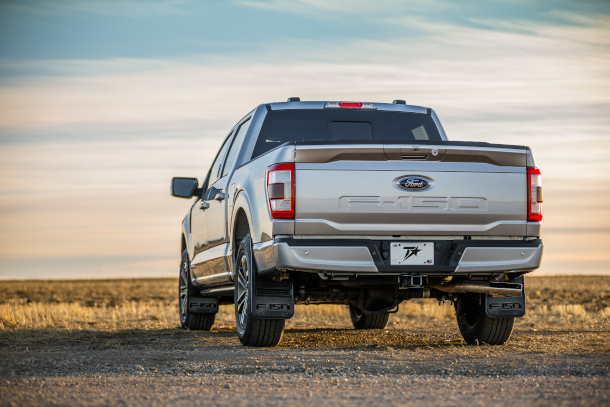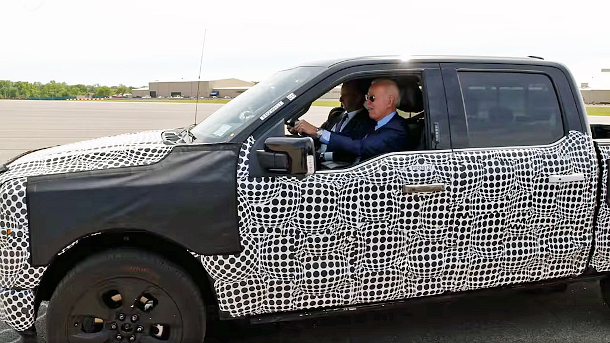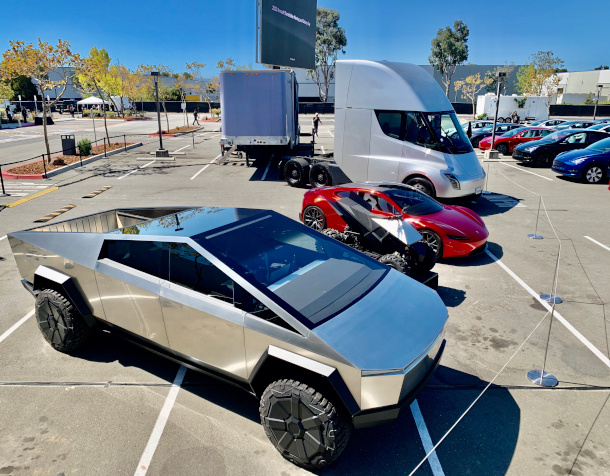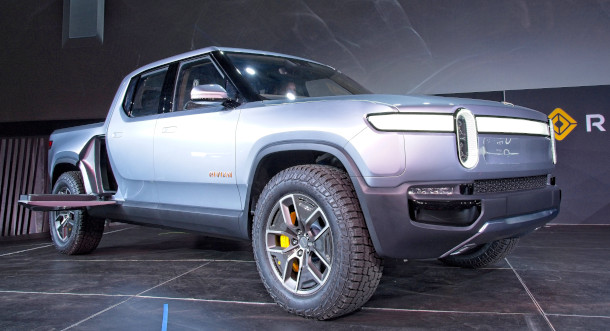The First All-Electric Ford Pickup
Air Date: Week of June 11, 2021

The gasoline-powered version of the Ford F-150 is considered the best-selling truck in the United States. (Photo: Truck Hardware, Flickr, CC BY 2.0)
Ford’s F-series are the best-selling vehicles in the United States. Now the all-electric version of the popular F-150 is making quite a storm in the auto industry and among aficionados. Jim Motavalli, freelance writer and blogger for Car Talk, joins Host Steve Curwood to talk about the future of the electric pickup in America's car market.
Transcript
CURWOOD: It’s Living on Earth, I’m Steve Curwood.
In 1900 one-third of cars produced in the United States ran on electricity and their popularity peaked around 1912. That was about when Charles Kettering invented the self-starter to replace the hazardous hand crank of gas cars and Henry Ford innovated the assembly line to make gas cars around half the cost of electric ones. So now a hundred years later electric vehicles are getting popular again, led in the US by Tesla and General Motors. And Ford recently unveiled its first all-electric pickup truck, the F-150 Lightning. President Biden recently got behind the wheel of one.
[CAR NOISES]
REPORTER: Mr. President!
BIDEN: This sucker's quick!
CURWOOD: For more on Ford’s popular F-150 and its new all-electric version I’m joined now by CarTalk blogger and green car writer, Jim Motavalli.
MOTAVALLI: Well, I think it's a real game changer for electric vehicles, we've had no electric pickups on the market. And this is despite the fact that the Ford F-150, the regular version, is the best-selling vehicle in America, there's 900,000 of them sold every year. And yet you couldn't get any kind of pickup in an electric and so virtually the entire American workforce has been forced to be on gasoline. But then Ford announces an electric version of the F-150. It's a dramatic entry into the market. Plus the specs of the truck are extremely dramatic. I mean, it can tow 10,000 pounds, it's got 230 miles of range as a base, there's a version with 300 miles of range. Payload is, like, 2000 pounds, a pretty capable truck. And it also has a lot of features where you can offload electric power from the truck, you can even power your house, or you can power a worksite. And you can plug in power tools, lots of cool features that do not exist on regular trucks. Plus it comes standard as a SuperCrew, which means it's like a five passenger vehicle. It's at least a double, probably a triple, maybe a homerun.

President Joe Biden test drives the Ford F-150 Lightning all-electric pick up. (Photo: The White House, public domain)
CURWOOD: Maybe a homerun. Well, I have to say the president looked like a teenager behind the wheel of a, I don't know, back in the day, a Pontiac GTO or something. He was so excited to hit the accelerator, which I guess is pretty astonishing, right? I mean, this thing moves.
MOTAVALLI: Well, Steve, one of the big advantages of electric vehicles is how fast they are off the line. Even the most pedestrian EV can give you very nice performance zero to 60. They have 100% of their torque available at zero RPM, which is why they make very effective drag racers. There's many videos of Teslas beating muscle cars in drag races. You know, the top speed may not be the same, but off the line, they are very impressive, which is why I'm sure Biden had fun driving one of those.
CURWOOD: So how big a deal is this now for Ford to be manufacturing this truck and sounding like they're gonna be first to market with an electric truck for this most popular of American trucks. So just how big a deal is this?
MOTAVALLI: I think it's a very big deal. I mean, right now, sales of plug-in vehicles are only at about 2% of the market. So in terms of actually cleaning up America's skies, getting gasoline out of the matrix, all that stuff, it's not really happening yet. But it's possible that this will become the first really big seller nationwide. I mean, you can look at the sales of Tesla, which is also extremely game-changing, because they've largely been dominating the luxury market. And you have to say that all the makers of the supercars have noticed that people are buying Tesla's instead of a lot of the other options like Ferraris or something. Because your Tesla can actually be faster than the Ferrari you buy. And it's why all the supercars are talking about switching to electric motors now, you can really get a lot more bang for the buck, as they say.

A lineup of Tesla vehicles, with the Cybertruck front and center. (Photo: Steve Jurvetson, Wikimedia Commons, CC BY 2.0)
CURWOOD: Let's talk about the money for a moment. They're going to sell this for $40,000. And by the way, where does the electric car tax credit fit into this?
MOTAVALLI: All the analysts were expecting it to be more because all the other electric pickups, and there are seven of them that are coming, are all priced way above that. The tax credit actually makes this even a better deal. Because on the F-150 Lightning, you can get a federal income tax credit of $7500, which takes the price down to like $33,000. You know, any SuperCrew pickup for 33 is a good deal. But with all the features on the electric, it's like a home run. It's not surprising, they've taken like 40,000 advance orders for this thing. I'm not surprised by that at all. And I think for instance, General Motors is coming out with a Silverado electric. The only thing they've really said about it is that it's going to have 400 miles of range. The price point is unknown. But they've got to take a look at what Ford just did, and they're probably drastically reducing the price they plan to ask because of this. Because you have other startups; Rivian is one, Bollinger is another. The Bollinger truck, which is going to be on the market in a year or so, that has a $125,000 price tag on it. So that's expensive.
CURWOOD: Yeah.
MOTAVALLI: And General Motors also announced an electric version of the Hummer. And that is going to start around $70,000, so that's why I thought maybe the F-150 Lightning would be a lot more. But by coming in so low, they really have changed the market, I think. Everyone was expecting it to be a lot more expensive and if you expect Ford to make a profit, it probably would be more expensive, because of how much batteries cost. There's maybe 110 to 150 kilowatt hours of battery on this thing. And that's going to be expensive. So my guess is they're probably losing money, at least initially. But that's how a company like Toyota ended up dominating the hybrid market by offering the Prius, probably a money losing proposition initially.

The Rivian R1T pickup at the 2018 LA Auto show. (Photo: Richard Truescell, Wikimedia Commons, CC BY-SA 4.0)
CURWOOD: So now what plans, if any, does Ford have on providing charging infrastructure around the country for these customers, so folks that have a pickup truck, it's all electric, it goes like a bat out of Hades. But you got to plug it in someplace?
MOTAVALLI: Well, yeah, it's hard to beat Tesla's charging network. One of the best things that Tesla did was to establish what they call the supercharger network across the country. And you can easily now - and initially, it was free, it's not always free now. But for certainly the initial buyers of the Tesla Model S, you got free charging across the country, and its high voltage, 400 volt charging, DC fast charging, which means that you could recharge in about half an hour. So you could and people definitely did drive their Teslas across the country. Now, Ford does not have any kind of network like that. But they said I believe in the announcement that they were going to have access to something like 60,000 chargers, I don't know, there was a big number, but they didn't give any details about that, how that's going to work.
CURWOOD: What have you seen if anything, as a reaction from Ford customers, or indeed other auto aficionados and, and truck drivers?
MOTAVALLI: Well, truck drivers are the ones ordering 40,000 of them. So I think they like it, I mean, it seems like they will. It did seem to me initially, that the traditional Ford truck buyer might be somewhat resistant to this. I mean, maybe they've owned like 10 generations of the F-150. And they're used to it being a certain thing. And this is a big departure from that. But I think they're going to be enticed by the features. There have been various hybrid trucks that have been on the market. But they only add a tiny bit of fuel economy, and they cost more. I don't think they were going to change the history and the hybrids are basically transitional technology anyway. I think we're going to finally see some serious sales with this vehicle.
CURWOOD: So Jim, come the end of the day, what role do you think electric trucks like the Ford are going to play in the future of the electric vehicle market?
MOTAVALLI: Well, you have to just sort of look at the vehicle market overall, which has shifted largely to pickups, and trucks and SUVs. So the American consumer definitely likes those formats. To the extent that Ford is largely not in the car business anymore. It's basically in the SUV and truck business. In a stunning, I thought it was a stunning move, they announced they were going to kill all their car lines except the Mustang. And that was crazy. But then they come out with a new version of the Mustang, which is the Mustang Mach-E, which is their electric car. And that's also very credible. So where they hadn't been all that credible in gas vehicles, suddenly, they're credible with electric ones, because both the Mach-E and the new F-150 Lightning, they're both very credible in the EV space. So it could transform what Ford is, as a company, I think it's going to be in a very short time will be all electric. And that is in line with a lot of other automakers' plans. For instance, Volvo said it's going to be all electric. Jaguar said it's going to be all electric. Bentley said it was going to be all electric. I mean, some vehicles, you wouldn't really expect to be electric, they're going in that direction.
CURWOOD: All right, Jim. So, look into your crystal ball. Tell me what's the future now of electric cars here in the United States.

Jim Motavalli is a freelance environmental journalist and blogger for NPR’s Car Talk (Photo: Seb Daly, Web Summit, Wikimedia Commons, CC BY 2.0)
MOTAVALLI: I think the future is very set, I don't have to have a crystal ball for this, because you can just look at what the automakers have said they're going to do and they're going to switch to all electric vehicles, they're gearing up. Most of the auto manufacturers, the major ones, they're no longer doing new engine programs. They're not, say commissioning a new V8 or a new V6 engine, it would be pointless. It would only be on the market for a year or two. So instead, the engines we've got now are pretty much the ones we're going to have. They're not going to build anymore. So they're putting way more money into electrification than they are into continuing the internal combustion vehicle. The exact timetable is a little unclear, but I would say by 2035, I think we're going to see pretty heavy concentration of the market be electric, and maybe by 2040, we won't have any internal combustion cars on the market. It's still slower than we probably need it to be for climate change and other reasons, but I do think that pivot is now inevitable and it doesn't need government regulation or mandates. It's going to happen.
CURWOOD: Jim Motavalli is a car writer for Sierra Magazine and blogs for NPR's Car Talk and writes for the New York Times. In fact, any place where you might encounter an article about cars, you might see something written by Jim Motavalli. Jim, thanks so much for taking the time with us today.
MOTAVALLI: Thanks for having me on.
Links
Click here to learn more about the Ford F-150 Lightning
Forbes Wheels | “7 Electric Pickups On The Horizon, Including Ford F-150 Lightning”
Living on Earth wants to hear from you!
Living on Earth
62 Calef Highway, Suite 212
Lee, NH 03861
Telephone: 617-287-4121
E-mail: comments@loe.org
Newsletter [Click here]
Donate to Living on Earth!
Living on Earth is an independent media program and relies entirely on contributions from listeners and institutions supporting public service. Please donate now to preserve an independent environmental voice.
NewsletterLiving on Earth offers a weekly delivery of the show's rundown to your mailbox. Sign up for our newsletter today!
 Sailors For The Sea: Be the change you want to sea.
Sailors For The Sea: Be the change you want to sea.
 Creating positive outcomes for future generations.
Creating positive outcomes for future generations.
 Innovating to make the world a better, more sustainable place to live. Listen to the race to 9 billion
Innovating to make the world a better, more sustainable place to live. Listen to the race to 9 billion
 The Grantham Foundation for the Protection of the Environment: Committed to protecting and improving the health of the global environment.
The Grantham Foundation for the Protection of the Environment: Committed to protecting and improving the health of the global environment.
 Contribute to Living on Earth and receive, as our gift to you, an archival print of one of Mark Seth Lender's extraordinary wildlife photographs. Follow the link to see Mark's current collection of photographs.
Contribute to Living on Earth and receive, as our gift to you, an archival print of one of Mark Seth Lender's extraordinary wildlife photographs. Follow the link to see Mark's current collection of photographs.
 Buy a signed copy of Mark Seth Lender's book Smeagull the Seagull & support Living on Earth
Buy a signed copy of Mark Seth Lender's book Smeagull the Seagull & support Living on Earth

